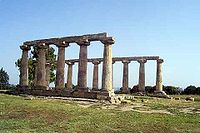- Magna Graecia
-
 Magna Graecia around 280 BC
Magna Graecia around 280 BC
Magna Græcia (Latin meaning "Great Greece", Greek: Μεγάλη Ἑλλάς, Megálē Hellás) is the name of the coastal areas of Southern Italy on the Tarentine Gulf that were extensively colonized by Greek settlers; particularly the Achaean colonies of Tarentum, Crotone, and Sybaris, but also, more loosely, the cities of Cumae and Neapolis to the north.[1] The colonists, who began arriving in the 8th century BC, brought with them their Hellenic civilization, which was to leave a lasting imprint in Italy, particularly on the culture of ancient Rome.
Contents
History
Antiquity
Main article: Greek colonies ("apoikiai")In the eighth and seventh centuries BC, for various reasons, including demographic crisis (famine, overcrowding, etc.), the search for new commercial outlets and ports, and expulsion from their homeland, Greeks began to settle in southern Italy (Cerchiai, pp. 14–18). Also during this period, Greek colonies were established in places as widely separated as the eastern coast of the Black Sea, Eastern Libya and Massalia (Marseille). They included settlements in Sicily and the southern part of the Italian Peninsula. The Romans called the area of Sicily and the heel of the boot of Italy Magna Graecia (Latin, “Great Greece”), since it was so densely inhabited by the Greeks. The ancient geographers differed on whether the term included Sicily or merely Apulia and Calabria — Strabo being the most prominent advocate of the wider definitions.
With this colonization, Greek culture was exported to Italy, in its dialects of the Ancient Greek language, its religious rites and its traditions of the independent polis. An original Hellenic civilization soon developed, later interacting with the native Italic civilisations. The most important cultural transplant was the Chalcidean/Cumaean variety of the Greek alphabet, which was adopted by the Etruscans; the Old Italic alphabet subsequently evolved into the Latin alphabet, which became the most widely used alphabet in the world.
Many of the new Hellenic cities became very rich and powerful, like Neapolis (Νεάπολις, Naples, "New City"), Syracuse, Acragas, and Sybaris (Σύβαρις). Other cities in Magna Graecia included Tarentum (Τάρας), Epizephyrian Locri (Λοκροί Ἐπιζεφύριοι), Rhegium (Ῥήγιον), Croton (Κρότων), Thurii (Θούριοι), Elea (Ἐλέα), Nola (Νῶλα), Ancona (Ἀγκών), Syessa (Σύεσσα), Bari (Βάριον), and others.
Following the Pyrrhic War in the 3rd century BC, Magna Graecia was absorbed into the Roman Republic.
The Middle Ages
During the Early Middle Ages, following the disastrous Gothic War, new waves of Byzantine Christian Greeks came to Southern Italy from Greece and Asia Minor, as Southern Italy remained loosely governed by the Eastern Roman Empire. The iconoclast emperor Leo III appropriated lands that had been granted to the Papacy in southern Italy[2] and the Eastern Emperor loosely governed the area until the advent of the Lombards then, in the form of the Catapanate of Italy, superseded by the Normans.
A remarkable example of this influence is the Griko-speaking minority which still exists today in the Italian regions of Calabria and Apulia. Griko is the name of a language combining ancient Doric, Byzantine Greek, and Italian elements, spoken by few people in some villages in the Province of Reggio Calabria and Salento. There is a rich oral tradition and Griko folklore, limited now, though once numerous, to around 30,000 people most of them having become absorbed into the surrounding Italian element. Some believe that the origins of the Griko language may ultimately be traced to the colonies of Magna Graecia.
Modern Italy
Although most of the Greek inhabitants of Southern Italy became entirely Italianized during the Middle Ages (as Paestum had already been in the 4th century BC), pockets of Greek culture and language remained and survived into modern times. This is because the "traffic" between southern Italy and the Greek mainland never entirely stopped.
Thus, for example, Greeks re-entered the region in the 16th and 17th century. This happened in reaction to the conquest of the Peloponnese by the Ottoman Turks. Especially after the fall of Coroni (1534) large numbers of Greeks and Albanians sought, and were granted, refuge in the areas of Calabria, Salento and Sicily. The Greeks from Coroni - the so called Coronians - belonged to the nobility and brought with them substantial movable property. They were granted special privileges and given tax exemptions. Another part of the Greeks that moved to Italy came from the Mani region of the Peloponnese. The Maniots were known for their proud military traditions and for their bloody vendettas (another portion of these Greeks moved to Corsica; cf. the Corsican vendettas). These migrations strengthened the depopulated Italian south with a culturally vibrant and militarily capable element.
Citations
See also
- Greeks in Italy
- Graia
- Graiki
- Names of the Greeks
- Graecus
- Griko people
- Griko language
Notes
References
- Luca Cerchiai, Lorena Jannelli, Fausto Longo, Lorena Janelli, 2004. The Greek Cities of Magna Graecia and Sicily (Getty Trust) ISBN 0-89236-751-2
- T. J. Dunbabin, 1948. The Western Greeks
- A. G. Woodhead, 1962. The Greeks in the West
External links
- Map
- Italy rediscovers Greek heritage
- Gaze On The Sea Salentinian Peninsula, Greece and Greater Greece (in Italian, Greek and English)
- Oriamu pisulina, traditional Griko song performed by Ghetonia
- Kalinifta, traditional Griko song performed by amateur local group
Categories:- Magna Graecia
- Ancient Italian history
Wikimedia Foundation. 2010.

